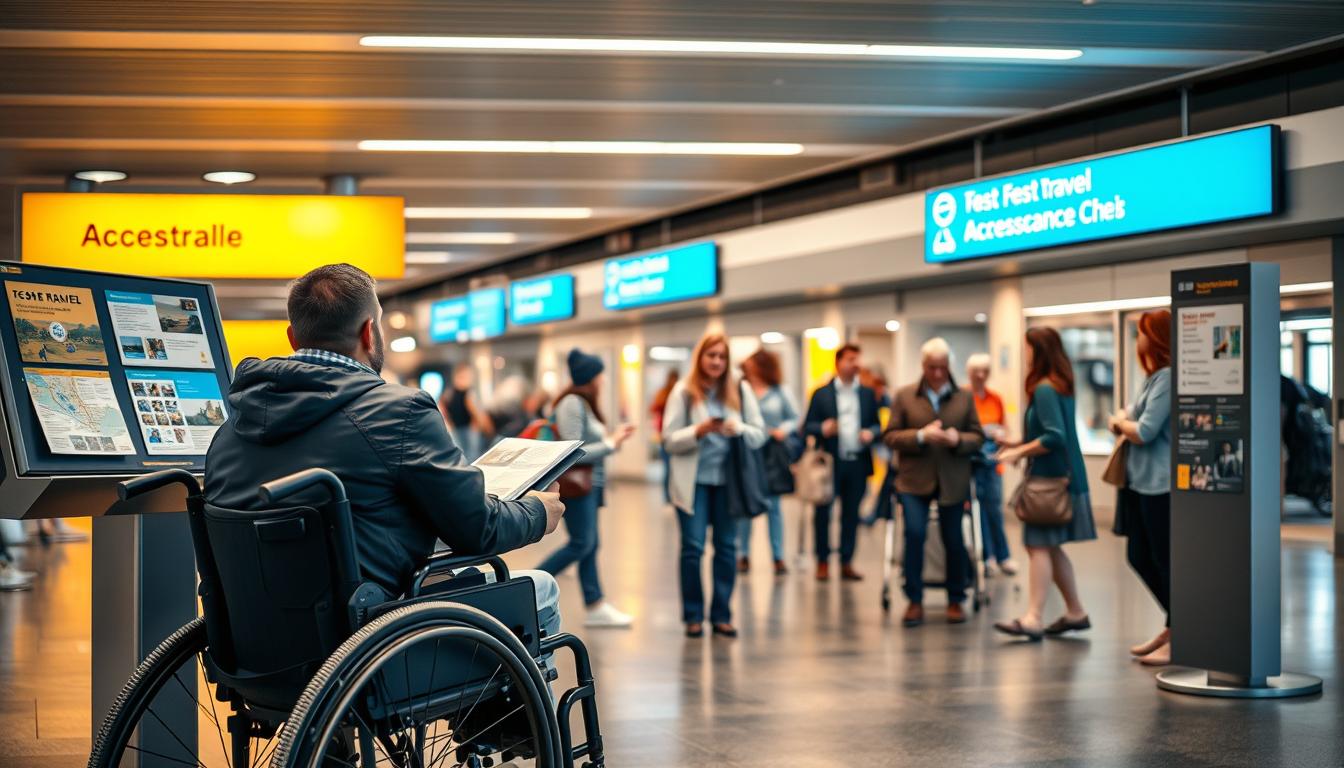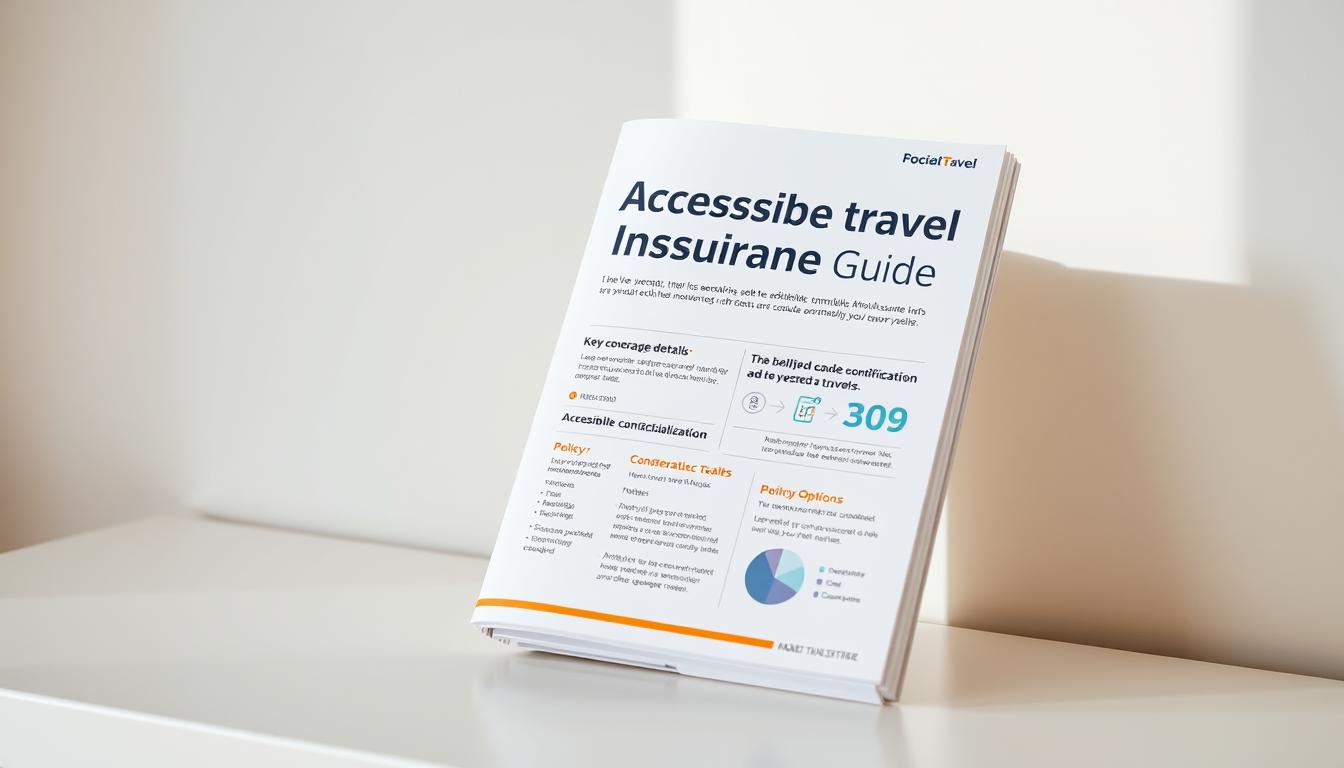Planning an adventure shouldn’t feel overwhelming. But what happens if your mobility equipment gets delayed or a medical situation arises? Having the right coverage ensures you’re protected, letting you focus on the joy of discovery.
This guide simplifies your options. Many assume specialized plans are required, but most policies already include essentials like emergency medical care or trip cancellations. Providers like Allianz even offer add-ons for equipment protection. Companies such as Wheel the World also design packages with unique needs in mind.
We’ll break down what matters most—from understanding fine print to choosing adaptable benefits. Whether exploring cities or nature trails, preparation is your best companion. Let’s create a safety net that works as hard as you do.
Introduction to Disability Travel Insurance
Exploring new places should excite you, not stress you out. Specialized protection plans bridge gaps in standard policies, offering tailored support for those navigating journeys with unique requirements. Let’s unpack how these plans work and why they’re essential.
What Does This Protection Include?
Disability-specific plans build on standard policies by adding critical safeguards. They cover scenarios like delayed mobility equipment or sudden health issues abroad. For example, if your wheelchair gets damaged during transit, certain providers reimburse repair costs within 24 hours.
Pre-existing conditions often get excluded in generic plans. However, specialized coverage typically includes them if disclosed upfront. This ensures you’re protected if a known medical issue flares up mid-trip.
Why Tailored Planning Makes a Difference
Accessible arrangements go beyond ramps and elevators. They involve vetting hotels for roll-in showers, confirming transportation options, and ensuring medical facilities nearby. Without this groundwork, unexpected hurdles can derail your experience.
Imagine booking a tour that suddenly can’t accommodate your needs. A robust plan might cover last-minute cancellations or help reschedule activities. This proactive approach turns potential frustrations into manageable bumps in the road.
Understanding Travel Insurance for Disabled Travelers
Adventure should be about discovery, not paperwork. The right safeguards let you focus on experiences while addressing potential hurdles. Let’s explore how specialized policies adapt to diverse requirements.
Key Coverage Features
Quality plans prioritize flexibility. For example, Allianz’s Premier tier covers equipment replacement if your mobility aid gets lost. Travelex includes emergency evacuation to nearby medical facilities. These features turn “what-ifs” into manageable scenarios.
24/7 multilingual assistance is non-negotiable. Imagine needing medication refills in a remote area – providers like IMG connect you with local pharmacies. This support minimizes disruptions and keeps trips on track.
The Role of Pre-Existing Conditions
Generic policies often exclude known health issues. Specialized options, however, protect you if stable conditions flare up during trips. For instance, World Nomads allows coverage when you disclose details upfront.
Compare basic and premier tiers:
| Feature | Basic Plan | Premier Plan |
|---|---|---|
| Equipment Loss | Up to $500 | Up to $2,000 |
| Pre-Existing Coverage | Excluded | Included* |
| Emergency Dental | $300 limit | Full coverage |
*Requires medical history submission 14 days pre-trip. This clarity helps avoid claim denials later.
Customized solutions address specific concerns – whether it’s backup oxygen tanks or accessible transportation rerouting. By matching coverage to individual needs, you create security that travels with you.
Coverage Details and Benefits
Unexpected events don’t have to ruin your journey—smart coverage turns setbacks into solvable puzzles. Let’s explore how tailored plans shield your budget and health when life throws curveballs.
Trip Cancellation and Interruption Protections
Imagine falling ill before departure or needing to return home urgently. A strong plan reimburses prepaid costs like flights and Airbnb bookings. For example, Allianz refunds up to 100% of non-refundable expenses, while Travelex offers $50,000 maximum coverage per trip.
Data shows 18% of claims involve last-minute cancellations. Providers like Seven Corners even cover weather-related disruptions. This safety net lets you reschedule stress-free.
Emergency Medical Care and Assistance
Global hospital networks and 24/7 support are lifesavers abroad. AXA’s Platinum plan includes $1 million for medical expenses, while GeoBlue covers emergency evacuations. Check if your plan partners with facilities near your hotels.
Consider this comparison for U.S. travelers:
| Provider | Hospital Coverage | Evacuation Limit |
|---|---|---|
| Allianz | 1.4 million+ | $1M |
| IMG | 950,000+ | $500K |
| WorldTrips | 1.1 million+ | $750K |
Always verify coverage for pre-existing conditions and equipment repairs. The right plan adapts to your needs, whether you’re navigating cities or remote trails.
Accessible Travel Resources and Planning Tips
Your journey begins long before departure—thoughtful preparation unlocks seamless experiences. Let’s simplify how to verify accommodations and transportation so your vacation stays focused on joy, not logistics.

Finding Accessible Hotels and Transportation
Start by partnering with platforms like Wheel the World, which uses photo verification to confirm roll-in showers, elevator access, and door widths. Always call hotels directly to ask specific questions: “Is the front desk reachable without stairs?” or “Are grab bars installed near toilets?”
For transportation, book accessible vehicles weeks ahead. Companies such as Accessible Travel Solutions offer vans with ramps in major cities. Double-check pickup times and driver training to avoid last-minute hiccups during your days of exploration.
Smart travel insurance plans act as backup. If a hotel fails accessibility promises, some policies reimburse alternate bookings under trip cancellation clauses. Review coverage for mobility aid repairs or medical transport needs common in traveling disability scenarios.
Pro tip: Reserve popular accessible tours or cruises 6-8 months early. Limited inventory fills fast, especially during peak seasons. Pair bookings with flexible travel insurance plans that allow date changes if plans shift.
Expert Tips for a Stress-Free Travel Experience
A smooth journey starts with smart preparation. Let’s explore how early planning and specialized partnerships turn potential headaches into confident adventures.
How to Start Planning Early
Begin organizing at least six months ahead. This gives time to secure wheelchair-friendly flights, verify hotel accessibility, and review insurance plans. Joy Burns of Wheel the World recommends creating checklists for each trip phase—packing, transportation, and backup equipment.
Compare timelines for different trip types:
| Trip Type | Ideal Planning Window | Key Tasks |
|---|---|---|
| International | 8-10 months | Visa approvals, equipment permits |
| Cruise | 6-8 months | Accessible cabin reservations |
| Domestic | 4-6 months | Transportation bookings |
Collaborating with Accessible Travel Specialists
Experts like Accessible Journeys handle complex logistics—from arranging airport wheelchair transfers to confirming roll-in showers. Their partnerships with hotels ensure rooms meet specific needs before arrival.
Always establish emergency protocols. Share medical details with your specialist and keep contact numbers handy. Many insurance plans include 24/7 support lines for sudden health issues abroad.
Pro tip: Test equipment like wheelchairs on similar terrain before long trips. This proactive approach prevents mid-journey surprises and keeps the focus on enjoyment per person.
Special Considerations for Cruise and Tour Options
Setting sail or joining group adventures requires extra attention to accessibility details. Cruise ships and guided tours often market inclusivity, but verifying specifics ensures smooth experiences. Let’s explore how to match these options with your needs while maintaining freedom and comfort.
Ensuring Wheelchair Accessibility on Cruises
Not all ships are created equal. Prioritize vessels with roll-in showers, automatic doors, and elevators connecting all decks. Royal Caribbean’s Oasis-class ships, for example, offer spacious staterooms with 32-inch doorways. Always confirm tender boat availability—some ports require transfers that lack ramps.
Key questions to ask cruise lines:
- Are accessible shuttles available at every port?
- Do onboard staff receive disability awareness training?
- What backup plans exist for equipment malfunctions?
Time your bookings wisely. Popular accessible cabins sell out 9-12 months early. Consider shoulder seasons for better availability and calmer seas that ease mobility challenges.
Organized Tours Tailored to Diverse Needs
Group excursions demand clear communication. Companies like Accessible Road Trips pre-screen hotels and attractions, providing detailed accessibility reports. Verify if vans have lifts or ramps—many “accessible” tours still use standard vehicles requiring transfers.
Balance structured activities with downtime. A 7-day European bus tour might include:
| Day | Activity | Accessibility Notes |
|---|---|---|
| 1 | City walking tour | Paved routes, benches every 0.3 miles |
| 3 | Museum visit | Elevators available, loaner wheelchairs on-site |
| 5 | Boat excursion | Ramp access, reserved seating area |
Always request recent photos of transportation and lodging. This proactive approach aligns options with your physical abilities while preserving mental energy for enjoyment.
Managing Travel Logistics and Emergency Preparedness
Confidence abroad starts with organized logistics and backup plans. When mobility challenges meet crowded airports or unfamiliar medical systems, smart strategies keep adventures on track. Let’s explore how to simplify transitions and access critical support when it matters most.
Airport Assistance and Flight Considerations
Request wheelchair services at least 48 hours before departure—airlines like Delta guarantee priority boarding when notified early. Arrive 2.5 hours pre-flight for domestic trips to account for TSA screenings. Programs like TSA Cares provide dedicated lanes for those with disabilities.
Pack backup battery packs for electric wheelchairs and laminated instruction cards for security. A 2023 survey showed 67% of equipment delays occur due to unclear labeling. Keep these essentials in carry-ons:
- Medical device manuals
- Airline accessibility confirmations
- Emergency contact sheets
| Airline | Pre-Boarding Time | Equipment Guarantee |
|---|---|---|
| American | 45 mins | 90% on-time |
| JetBlue | 60 mins | 95% on-time |
| United | 30 mins | 85% on-time |
24/7 Emergency Support and Global Hospital Networks
Quality providers like GeoBlue connect you to vetted facilities within 15 minutes of a call. Their partners in 190 countries ensure consistent care standards—critical for managing flare-ups of chronic conditions.
Review this comparison when choosing coverage:
| Provider | Response Time | Facility Access |
|---|---|---|
| Allianz | 10 mins | 1.4M+ globally |
| IMG | 20 mins | 925K+ |
| Seven Corners | 15 mins | 1.1M+ |
In 2022, a traveler with multiple sclerosis in Barcelona accessed specialized treatment within 90 minutes through Allianz’s network. This real case shows how robust plans turn crises into manageable events.
Update emergency protocols each travel day. Share medical summaries with companions and save local ambulance numbers offline. With layered preparation, you’ll navigate surprises without losing sight of the joy ahead.
Conclusion
Your next journey deserves thoughtful preparation and reliable safeguards. By pairing early planning with adaptable coverage, you create freedom to explore without second-guessing risks.
Specialized protection addresses unique requirements—whether securing backup equipment after a delay or accessing emergency care abroad. Partnering with experts like Wheel the World ensures accommodations meet your needs, from flight bookings to hotel layouts.
Remember: success lies in details. Confirm access features in transportation, verify medical coverage for pre-existing conditions, and document essential gear. Early collaboration with specialists minimizes surprises, letting you focus on activities that spark joy.
Take charge now. Review policies covering wheelchair repairs or trip interruptions. With the right tools and planning, every adventure becomes a story worth telling—safely and confidently.


